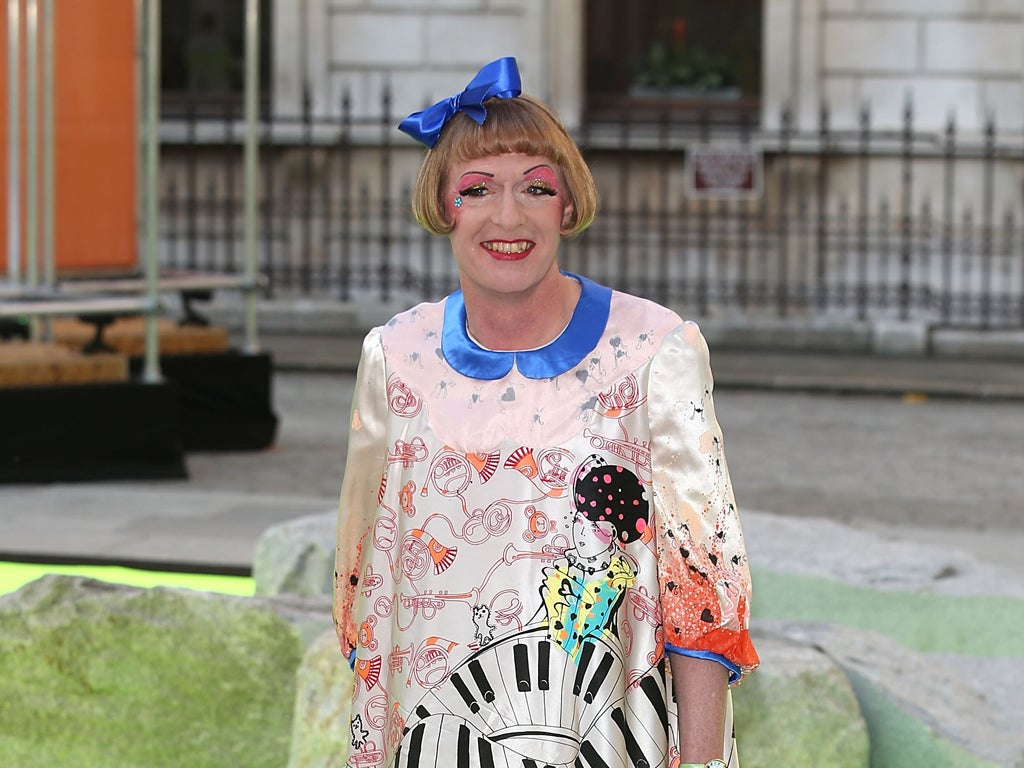How Grayson Perry and The Reith Lectures will restore your faith in the BBC
His easy conversational style - and his Estaurine delivery - makes him the most approachable of art world luminaries


Your support helps us to tell the story
From reproductive rights to climate change to Big Tech, The Independent is on the ground when the story is developing. Whether it's investigating the financials of Elon Musk's pro-Trump PAC or producing our latest documentary, 'The A Word', which shines a light on the American women fighting for reproductive rights, we know how important it is to parse out the facts from the messaging.
At such a critical moment in US history, we need reporters on the ground. Your donation allows us to keep sending journalists to speak to both sides of the story.
The Independent is trusted by Americans across the entire political spectrum. And unlike many other quality news outlets, we choose not to lock Americans out of our reporting and analysis with paywalls. We believe quality journalism should be available to everyone, paid for by those who can afford it.
Your support makes all the difference.In recent times, it has become increasingly tricky to defend the BBC. The offensively huge payouts, the overweening bureaucracy, the Savile saga, the corporation's bloated hierarchy: they have all weakened the resolve of those of us who believe the Beeb to be one of the nation's most admirable institutions. In particular, the wheelbarrows full of cash handed out to departing executives have left many of us without an answer in the face of the Daily Mail's latest attack.
But then the BBC does something to restore your faith, something only a public service broadcaster could do, and something which makes you realise: oh, that's what I pay the licence fee for. The Reith Lectures is one such example. Named after the BBC's first director-general Lord Reith, this annual event - a series of talks given by a leading thinker of the time - was designed to enrich the cultural and intellectual life of the nation.
And a lineage that began in 1948 with a philosopher and Nobel Laureate has now extended, in 2013, to a transvestite potter and conceptual artist. From Bertrand Russell to Grayson Perry - and all points in between - the Reith Lectures encapsulates everything that's laudable about the BBC.
I defy anyone to listen to Grayson Perry's first lecture in a series entitled "Playing to the Gallery" and not to be entertained, or entranced, or illuminated, or provoked. From the very first moment, when he was introduced by Sue Lawley as the "first cross dresser to present the Reith Lectures - "As far as we know," countered Perry like a flash - the man who won the Turner Prize in 2003 took us on a coruscating journey through the modern art world, trying to explain who decides if a piece of art is good or not, what makes it popular, what gives it value.
His easy conversational style - and his Estaurine delivery - makes him the most approachable of art world luminaries. In fact, one of the most powerful passages in his first lecture was when he exposed the vacuousness and pretentiousness of some of the language used in arty circles. He said that seriousness is the most prized currency in the art world, and seriousness is protected by language. He told of an editor of Art Forum magazine, of whom it was said: "English wasn't her first language, so the magazine suffered from the wrong sort of unreadability".
His discourse on what he refers to as "International Art English" was sharp and funny. He uses the example of a wall text from a recent Venice Biennale. "A Common Ground is based on the fact that affectivity remains a central access in contemporary Uruguayan artistic production..." This goes on and on in the same vein: Perry said that "International Art English" has been described as "rebuking ordinary English for its lack of nouns". So global becomes globality, potential becomes potentiality, and so on. He is so right, and I have noticed this verbal peculiarity has crept into other areas of our life, and particularly in the media world. Perry has the tonality of a true polymath, and I'm grateful to the BBC for inviting him into my life.
Join our commenting forum
Join thought-provoking conversations, follow other Independent readers and see their replies
Comments